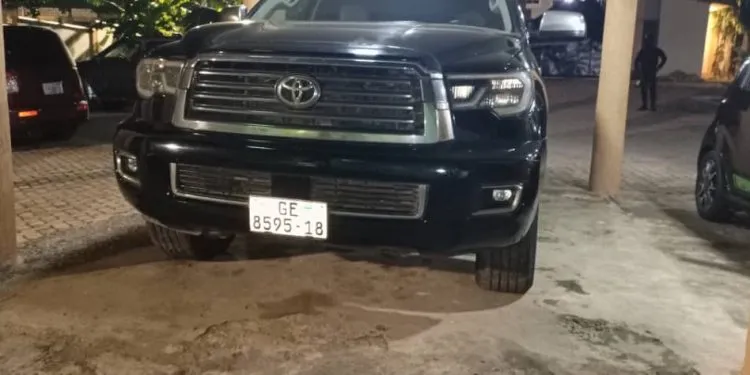The unfolding investigation into suspected asset misappropriation by Maxwell Kofi Jumah, former Managing Director of GIHOC Distilleries, has escalated with the revelation that one of the state-owned vehicles under scrutiny was allegedly being used by his son. This discovery followed a pre-dawn operation conducted by national security operatives at Mr. Jumah’s residence on May 15, 2025, aimed at retrieving official vehicles believed to have been improperly retained after his departure from the company. Mr. Jumah, who served during the Nana Akufo-Addo administration, was reportedly absent during the operation. Upon being informed of the operation, Mr. Jumah is said to have instructed his private security to return the vehicles, reportedly acknowledging that one of the cars had been in his son’s possession. This action adds another layer of complexity to the ongoing investigation, raising further questions about the management of state assets under his leadership.
The vehicle in question is part of a trio currently under investigation by state authorities. One of the vehicles is a Genesis G90 luxury saloon car, which records indicate was sold to Mr. Jumah at a mere 5% of its market value. This deeply discounted sale has raised significant concerns about the legality and transparency of the transaction, prompting investigators to scrutinize the process through which Mr. Jumah acquired the vehicle. Furthermore, an Audi valued at over $60,000 is also believed to have been retained by Mr. Jumah without the necessary formal approval from the company’s board. The absence of proper authorization raises questions regarding potential breaches of company policy and established procedures for the disposal of state assets.
As of now, one of the three vehicles has been successfully recovered and returned to Accra, while efforts to locate the remaining two vehicles are ongoing. The recovery of the first vehicle represents a tangible step forward in the investigation, providing investigators with physical evidence to examine. The continued search for the remaining vehicles highlights the commitment of the authorities to fully investigate the extent of the alleged misappropriation and ensure the return of all state-owned assets.
The broader investigation, spearheaded by national security and supported by various government agencies, centers on potential violations of public asset management regulations and misconduct related to the sale and retention of government property. The scope of the investigation extends beyond the specific vehicles in question, encompassing a broader examination of Mr. Jumah’s dealings with state assets during his tenure as Managing Director. This includes scrutinizing the processes and procedures followed for the disposal of government property and assessing whether any undue advantages were granted to Mr. Jumah or any other individuals.
As the investigation progresses, investigators are expected to summon Mr. Jumah for questioning to ascertain whether due process was adhered to during his leadership at the state-owned company. This questioning will be crucial in gathering Mr. Jumah’s perspective on the events and obtaining his explanation for the alleged irregularities. The investigators will likely focus on understanding the circumstances surrounding the sale of the Genesis G90 at a significantly reduced price, the retention of the Audi without board approval, and the use of one of the vehicles by his son. This information will be crucial in determining the extent of Mr. Jumah’s involvement and assessing whether any wrongdoing occurred.
The investigation’s outcome holds significant implications for accountability and transparency within state-owned enterprises. The public scrutiny surrounding this case underscores the importance of upholding ethical standards in the management of public resources. Depending on the findings, this investigation could result in criminal charges, civil penalties, or administrative sanctions. Furthermore, the case highlights the need for robust internal controls and oversight mechanisms within state-owned companies to prevent future instances of asset misappropriation and ensure the responsible stewardship of public funds. The investigation serves as a reminder of the importance of transparency and accountability in the management of public resources and the potential consequences for those who abuse their positions of trust.


